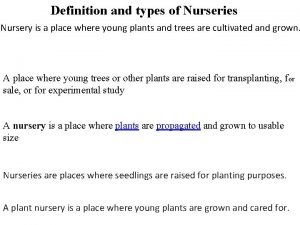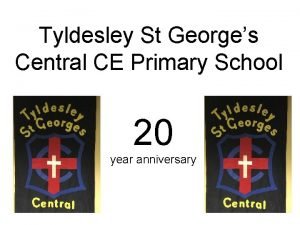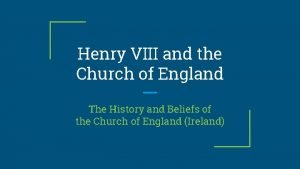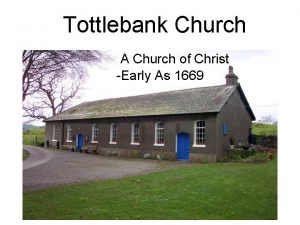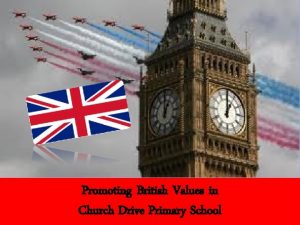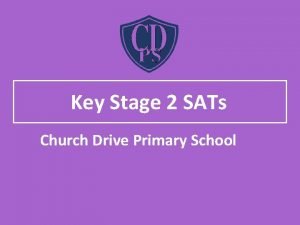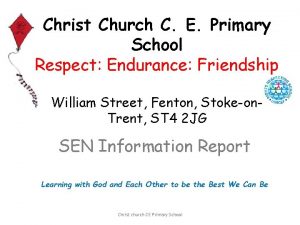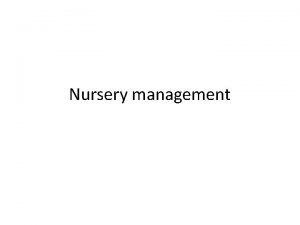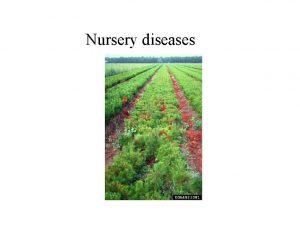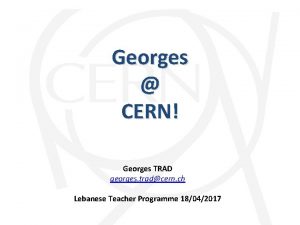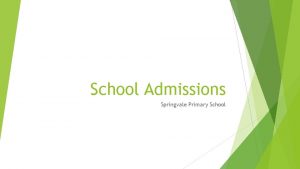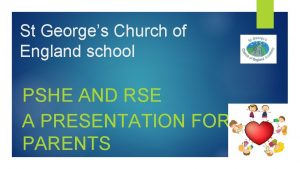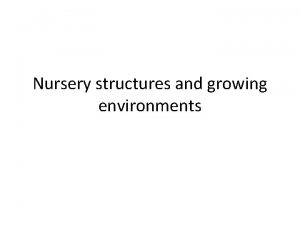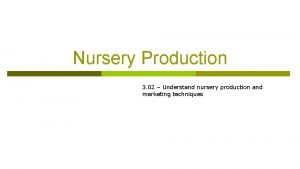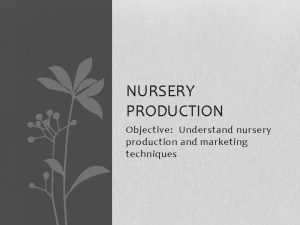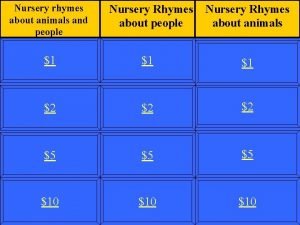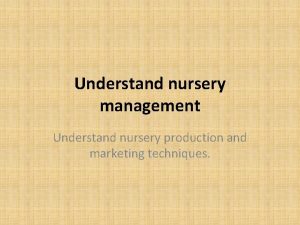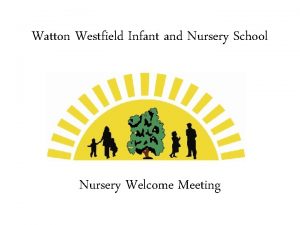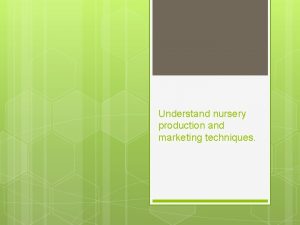ST GEORGES CHURCH OF ENGLAND PRIMARY AND NURSERY















- Slides: 15

ST. GEORGE’S CHURCH OF ENGLAND PRIMARY AND NURSERY SCHOOL RELATIONSHIPS AND SEX EDUCATION Consultation with our School Community

New Guidance It has been 20 years since the last review of the curriculum - the world (and how we interact with each other) has changed New - Relationships Education in Primary Schools Previous recommendations for teaching Personal, Social, Health Education (PSHE) are now part of the National Curriculum. Sex Education in Primary Schools remains optional, though in Year 5 & 6 the science curriculum forms part of what might be considered as sex education - puberty and reproduction. This is statutory and children must be taught this content. 2

SCIENCE CURRICULUM As part of the Science curriculum we teach the following statutory objectives that build understanding about growth and reproduction: Year One Identify, name, draw and label the basic parts of the human body and say which part of the body is associated with each sense. Year Two Notice that animals, including humans, have offspring which grow into adults they should not be expected to understand how reproduction occurs. Year Five and Year Six Describe the life process of reproduction in some plants and animals. They should learn about the changes experienced in puberty. 3

Where and how did you learn about sex and relationships? For young people now, their learning comes from… Mobile phones TV Internet School Friends & Older Siblings Parents & Carers

Why is Relationships and Sex Education important? • • • Entitlement Puberty is starting earlier - for some children by age 9 Unwanted conceptions Sexually transmitted infections Safeguarding • Grooming • Child Sexual Exploitation • Abuse • Sexting • Online pornography

What is effective Relationships &Sex Education (SRE)? • • Age appropriate Based on needs of pupils Progressive Inclusive Delivered by trained staff in a safe environment Prepares children adequately for puberty in a timely way Prepares children for adult life Promotes positive relationships

Does it work? What’s the evidence? Those receiving good quality RSE are more likely to: • Delay their first sexual experience • Use condoms for contraception • Have fewer sexual partners Kirby 2007

Ofsted review of existing RSE nationally • Required improvement in over a third of schools, it was not systematic enough. • Children were not adequately prepared for puberty. • In Primary Schools, too much emphasis was placed on friendships and relationships.

Your rights as a parent: • To be informed of the RSE curriculum and policy. • To be consulted about changes to these. • To withdraw your child from Sex education lessons (that are additional to the Science National Curriculum)

What do children say? What children think about relationships: Typically a Year 2 might say: • Friendships – where you really like someone you chat and play together. • Some mums and dads do/don’t have relationships. Curious to know why. • It’s when you love each other. Typically a Year 4 might say: • It is when you are happy with someone you really like or even love. • It is being able to talk to someone you trust. • Its when you are kind to each other and look after each other. Typically a Year 6 might say: • You can get healthy and unhealthy relationships. • Its not good if people argue, you have to have respect in a relationship. • Sometimes people get married but some don’t and that’s ok. • It could be a boyfriend or a girlfriend if you are older.

What do children say? What children feel they need to know about now: Typically a Year 2 might say: • Mainly about rules and keeping safe (zooming safely, ‘stranger danger’). • How to not fall out so much. • Why do parents sometimes split up? Typically a Year 4 might say: • What healthy relationships look like. • Body changes - growing bigger, voice changes • Marriage and dating (though they didn’t think any dating would start until secondary school) Typically a Year 6 might say: • Hormones, body changes, relationships with family/friends, gender and sexuality; gender stereotypes. • Fake accounts online and adults pretending to be children.

What do children say they need to know? Year 2: • Internet safety and strangers ‘pretending’ to know you. • How to use a phone. • Who they will marry. Year 4: • Having babies – knowing when you should have them. • A good age to have a ‘proper’ relationship. • Body changes - periods and hair growing under armpits. Year 6: • When it is a ‘good age’ to have a baby. • What happens when you have a baby. • To know how and when to ‘do it’ and how to be safe. • How to know if you are safe in a relationship.

In the picture where did children think the baby had come from? Year 2: Year 4: Year 6: • It could be found on a doorstep from God • It is from her tummy • Sometimes mums adopt a baby and they find the baby in a box by the front door. They just find them • It’s from her noo • No the privates • It came out of the bottom • It came from her mouth • Did it come out of the belly button? • • • Lots of giggling • It comes from the mother, from inside her • A man and a woman have fun • At the hospital the lady makes loads of noise and has it out • They get it out in a big bath • You push it out • The man gives the lady a seed and the seed fertilizes an egg • Squirmy things travel through the body and try to get into the egg and if three get in they could have triplets • From a hole that stretches and you sometimes need stitches • • I heard it really hurts A girl and a boy did it It might have been adopted It’s was peanut in the belly Heaven – they come from God he makes them After a girl falls in love some tadpoles go to her core thing and lay eggs in the belly It was from her vagina or was it the bottom? Giggles and confusion It’s the bit in front of the bottom

Summary • Parents have the right to withdraw children from Sex Education lessons at Primary School that go beyond the content in the Science National Curriculum. • Topics covered related and linked to the Science Curriculum are statutory and not optional to teach. This is as follows: • In Key Stage 1, children learn that animals, including humans, have offspring that grow into adults. They should be introduced to the concepts of reproduction and growth but not how reproduction occurs. • In Upper Key Stage 2 (Year 5/6), children are taught about the life cycles of humans and animals, including reproduction. They also learn about the change that happen in humans from birth to old age. This includes learning about what happens in puberty. • School’s have the right and obligation to teach RSE to prepare children for life when they leave school. • The curriculum on Relationships and Sex Education should complement, and be supported by, the school’s wider policies on behaviour, bullying and safeguarding (PSHE; E-Safety, Relationships etc. )

Next Steps: • Please look at the materials on the school website : • Please respond to the survey: We are particularly interested in your views about when to tackle different concepts and any areas you might like further support with at home. We are aware that there will be differences of opinion, but we will take your views into account when we finalise our policy and curriculum plan. We will share this with you when it is finalised. Thank you.
 What is a nursery
What is a nursery St georges school tyldesley
St georges school tyldesley St georges primary school
St georges primary school Church of england beliefs
Church of england beliefs Tottlebank church of christ in england
Tottlebank church of christ in england Picasso bread
Picasso bread Church drive primary school
Church drive primary school Church drive primary school homework
Church drive primary school homework Christ church primary school fenton
Christ church primary school fenton Georges gonthier
Georges gonthier Je suis tres emue de vous dire
Je suis tres emue de vous dire Dihydrotestosterone
Dihydrotestosterone Georges braque le jour
Georges braque le jour Georges nikakis
Georges nikakis Raymond georges yves tanguy
Raymond georges yves tanguy Elffetheia
Elffetheia
